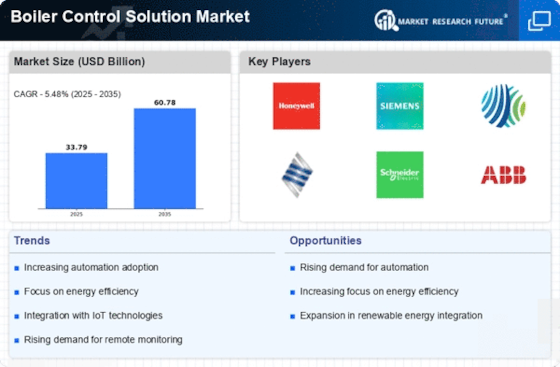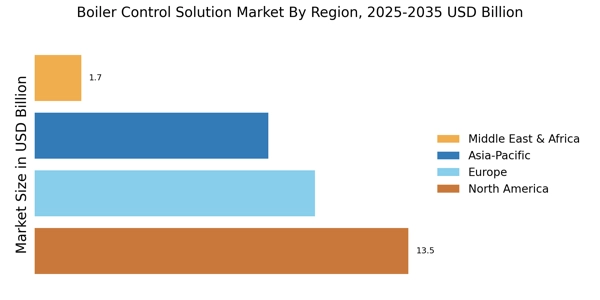Expansion of the Manufacturing Sector
The Boiler Control Solution Market is positively impacted by the expansion of the manufacturing sector. As manufacturing activities increase, the demand for reliable and efficient boiler systems rises correspondingly. Industries such as food processing, pharmaceuticals, and chemicals rely heavily on steam generation, making effective boiler control solutions essential. The manufacturing sector's growth is projected to contribute significantly to the boiler control market, with estimates suggesting a potential increase in market size by over 15% in the coming years. This expansion underscores the necessity for advanced boiler control systems that can meet the evolving needs of diverse manufacturing processes, thereby driving innovation and competition within the market.
Growing Emphasis on Environmental Regulations
The Boiler Control Solution Market is significantly influenced by the growing emphasis on environmental regulations. Governments and regulatory bodies are implementing stringent standards aimed at reducing emissions and promoting sustainable practices. This regulatory landscape compels industries to adopt advanced boiler control solutions that ensure compliance with emission norms. For instance, the implementation of low-NOx burners and advanced control algorithms can lead to a substantial reduction in harmful emissions. As a result, the market for boiler control solutions is expected to expand, with a projected increase in demand for eco-friendly technologies. This shift not only aligns with regulatory requirements but also enhances the corporate image of companies committed to sustainability.
Technological Advancements in Control Systems
Technological advancements play a pivotal role in shaping the Boiler Control Solution Market. Innovations such as predictive analytics, machine learning, and real-time monitoring are revolutionizing boiler control systems. These technologies enable operators to anticipate issues before they escalate, thereby minimizing downtime and maintenance costs. The integration of advanced sensors and data analytics tools allows for more precise control of boiler operations, leading to improved efficiency and safety. Market data suggests that the adoption of these advanced technologies is likely to increase, with a projected market growth rate of around 10% annually. This trend indicates a shift towards more intelligent and responsive boiler control solutions that can adapt to dynamic operational environments.
Increasing Investment in Energy Efficiency Projects
The Boiler Control Solution Market is witnessing an increase in investment directed towards energy efficiency projects. As organizations seek to reduce energy consumption and operational costs, the demand for efficient boiler control solutions is on the rise. Investments in energy-efficient technologies not only contribute to cost savings but also align with corporate sustainability goals. Recent studies indicate that companies implementing energy-efficient boiler control systems can achieve energy savings of up to 30%. This trend is likely to drive the market forward, as more industries recognize the long-term benefits of investing in energy-efficient solutions. The focus on energy efficiency is expected to remain a key driver in the boiler control market.
Rising Demand for Automation in Industrial Processes
The Boiler Control Solution Market experiences a notable surge in demand for automation within industrial processes. As industries strive for enhanced operational efficiency, the integration of automated boiler control systems becomes increasingly vital. These systems not only optimize fuel consumption but also reduce operational costs, thereby appealing to manufacturers aiming to improve their bottom line. According to recent data, the automation segment within the boiler control market is projected to grow at a compound annual growth rate of approximately 8% over the next five years. This trend indicates a shift towards more sophisticated control solutions that can adapt to varying operational conditions, ultimately leading to improved productivity and reduced downtime in industrial settings.
.png)

















